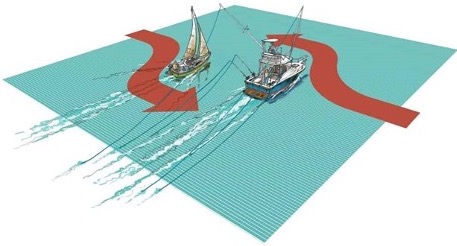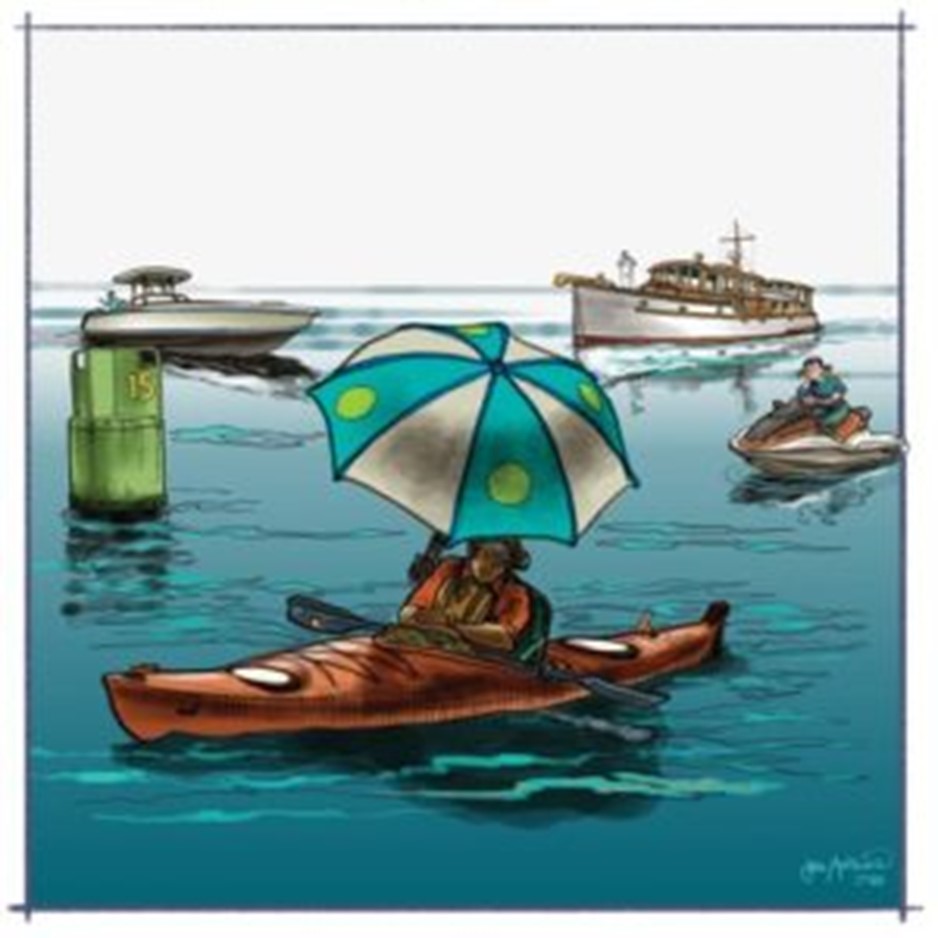Capt. Jody's Guide to Boating Etiquette — Part III

Be a Wise Guy on the Water
These are rules more than etiquette, but no less important to maintaining world peace on the water.
Rule 1 — Never leave the helm untended.
Sounds like a no-brainer, but Capt. Jody can tell you stories that will make you weep, though sometimes with laughter. In brief, don’t put a course into your chart plotter and then go below to make yourself a roast beef sandwich. So bad.
Rule 2 — Watch behind as well as in front and to the sides.
True story: Imagine the surprise of the couple sailing up the Severn River who looked behind them to find that a submarine had just surfaced a few feet off their stern.
Rule 3 — Might makes the right of way.
Yes, you may have right of way in a particular situation, but you never have the right to hit anybody else. Take early and clear measures to avoid a collision. That’s the law, too, Pilgrim. Besides, it gets so messy.
Be Zen: The Nitty Gritty of Happy Coexistence

Capt. Jody is not going to sail headlong into the rocky shoals of the right of way today. This is about how to do the right thing, thereby making yourself and everyone else happy. Remember, we’re all here because we love being out on the water. We just have different ways of going about it. So, wake up, class—you, too, Rob—because here comes the most important part of this whole shebang. Whether you are in a recreational powerboat, a sailboat, fishing boat, paddle craft, PWC or waterski boat, you know that you have definite ideas about how you’d like to be treated on the water. But not everyone else knows how that is. Here it is in a nutshell.
Rule 1 — What everybody wants:
- Sailboats prefer that you pass behind them. And to leeward.

- Fishing boats with lines and boards out prefer that you pass in front of them. And far away, preferably in the next county.
- Paddlers want you to be very mindful of your wake. Slow down. These are little dudes and easily awash. Pass them on their stern.
- Water ski boats want you to stay well away from their tows.
- Tip: In many controlled areas, ski boats must tow counter-clockwise.
Rule 2 — What nobody wants:
- Jet-skiers — Nobody wants you riding their wake. It puts a nerve-wracking burden on the other boat and restricts its movements, especially in avoiding other traffic. If you feel you must, ask. And remember, just because you are maneuverable, you are not invulnerable.
- Paddlers — Do not choose the middle of a channel to stop and admire the view. And please don’t paddle down the middle of the channel.
- Powerboaters — It’s a myth that staying away from a vessel while passing at speed will dissipate your wake. In fact, it gives it a chance to multiply so that the other boat will feel it much longer. Also, look behind you to determine what speed produces the least wake. In fact, make a practice of looking behind you, and not just for submarines.
Be a Superstar: The Ultimate Etiquette of the Slow Pass
The slow pass is familiar to those who go up and down the Intracoastal Waterway, at least until they get to Florida when all bets are off. When properly done, it’s a beautiful thing and everyone feels happy and perhaps a little bit self-righteous about it. It’s one of the secret joys of the ICW. But it works sometimes on the Chesapeake as well. Here’s how it’s done:
Overtaking another boat: Call the slower boat on VHF 16 and say, “If you slow down, I’ll give you a slow pass.” The slower boat responds, “Thanks, I’ll pull back.” Immediately, the slower boat backs down—way, way down—so that the faster boat can back way down as well, thereby greatly reducing the size of the wake. The slower boat must play its part by slowing enough. Otherwise, the faster boat has to keep up speed, and its wake.
Being overtaken by another boat: It can work the other way as well. See that you are being overtaken at close quarters? Call on 16 and say, “I’ll slow down if you’ll give me a slow pass.” Desired response: “Yes, that’s fine.”
Being Douglas Fairbanks and Mary Pickford: Okay, that reference was even too old for Capt. Jody. The silent screen version of the slow pass is simply that the slower boat sees it’s being overtaken, slows way, way down, and the overtaking boat reciprocates. Or vice versa. Everyone is happy and a little bit smug because nobody had to say a word.
That’s it, class, Capt. Jody thanks you for your attention. And remember, etiquette is just the 18th-century French way of saying “ticket.” No, wait, the modern English word for, “have care for the other person.” Or, put another way, when Mama’s happy, everybody’s happy. And everybody is somebody’s Mama. Um, well, you know what I mean.